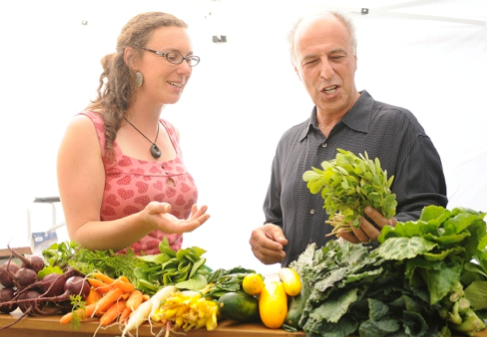More and more Vancouverites are asking for local food on their dinner plates. For diners and chefs, access to it is getting better, and everyday consumers can get their hands on local with greater ease, too. But
it’s still a slog for local farmers to get their crops to market. A new local food hub initiative launched in May could make a difference for farmers.
More than a decade ago, Granville Island Market ran a bus advertisement campaign featuring chef Vikram Vij. Alongside a shot of Vij in his chef jacket, the ad explained committed chefs such as him took time out of their busy days to make trips to the market for the freshest ingredients.
At the time, I worked at Capers Markets on Fourth Avenue, where direct buying from local growers was done with reverence and deep care. I often saw Vij in the store’s produce department, so I knew the
Granville Island campaign was legit; Vij really did care. But I also remember thinking, yikes, what a time-suck for this guy. One of the most legendary chefs in our city has to personally scour markets to find good ingredients for his fresh sheet.
All these years later, virtually every grocery store, even Urban Fare, the store that infamously flew in $100 baguettes from Paris, touts its local offerings. Increased demand has supported the growth of farmers markets to the current nine weekly locations within the boundaries of Vancouver alone.
Aside from claims that local is better quality, and that support for local farmers makes us feel connected to our food, there are economic benefits to buying local, which is why even the Greater Vancouver Food Bank Society now works with local farmers, committing to volumes in advance of the growing season in exchange for lower prices.
But demand isn’t the only issue that keeps our food supply less than local. For farmers, delivering door to door around the city isn’t practical. Fuel costs, time away from the farm and a low average order size make it hard for farmers to make a better living, even if they have more customers.
Growing great food is a rare skill set in our society, and just because someone is a great farmer doesn’t mean they’re also experts in logistics or marketing. It’s been clear for a long time that in order to have a stronger local food system, we need to make it easier for farmers to sell what they grow.
Vancouver’s Farmers Markets, along with several local food advocates, have been sniffing around the problem for years. From 2007 until last year, the group, under the project name New City Market, ran focus groups and generated draft business plans for a bricks-and-mortar local food distribution centre that could connect locally farmed goods to restaurant and retail buyers. The proposal kept landing with a thud, especially when farmers were asked if the proposal would solve their difficulties. The built-to-suit facility promised to be “the jewel in the crown” of our local food system and would have been expensive, requiring ongoing cash to make it work.
It appears that everyone went back to the drawing board. In May, Vancouver Farmers Market, in partnership with FarmFolk CityFolk, launched a pilot project for an online food hub. The Vancouver Local Food Hub (VLFH) online portal allows farmers to receive orders from registered customers — primarily restaurants and retailers. Farmers pick the orders and drop them at one location in Abbotsford. The VLFH then trucks the orders right to the customer’s door.
No fancy new building like the earlier proposal, but this new model stops farmers from being delivery truck drivers. Farmers set their own price, and the markup charged to customers is fair, covering administration and transportation costs.
So far, the pilot has six farms on board to provide a variety of restaurant staples such as berries, tomatoes and peppers. The service will not include meat or fish, which is probably disappointing for restaurateurs who often hang their menus on protein, but keeping to fruits and vegetables reduces risk and keeps things simple.
More than 40 customers have signed on for twice-a-week deliveries, including Choices Markets, Rocky Mountain Flatbreads and, of course, Vij’s restaurants.
I’ve got my fingers crossed for the Vancouver Local Food Hub. Our farmers could use a break.
trishkellyc@gmail.com
@trishkellyc



